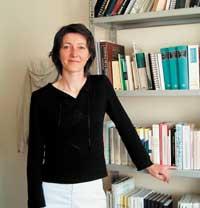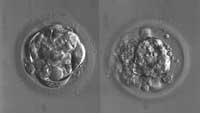Itziar Alkorta: "The main problem is that the status of the human embryo is not defined"
Stem cell research has generated intense ethical debate. Why?

Around these studies there are two problems: one ethical and the other, although it is less mentioned that for me it is very important, economic.
From an ethical point of view, the problem is complex and has many aspects. On the one hand, one of the sources of stem cells are embryos, human embryos, and their study generates an ethical problem. It is necessary to define what the embryo is and, according to how it is understood, there are two extreme positions. Some believe that the embryo not yet established in the mother's womb is one thing and that it needs no other consideration. On the contrary, those at the other extreme, especially the Catholic Church, believe that the embryo is a person from fertilization. There are intermediate opinions. For example, the European Ethics Committee considers that the embryo deserves more protection than things, it is an ethically worthy good.
Secondly, there is the right to health of the sick and society, which is opposed to various attitudes in favor of the right to life of the embryo. On the other hand, there is freedom to investigate scientists. This has a great weight in today's society, as historically research has allowed society to move forward.
Finally, there is an ethical problem that has rarely been mentioned but which I think is important: women's freedom and the protection of women's rights. Why? This is due to the need for eggs for the formation of these embryos and the extraction of them requires relatively harsh and unpleasant medical treatments. To some extent, sometimes women are used in exchange for money as egg suppliers and I think that can become a danger.
These four aspects are to be highlighted ethically and among them the conflict arises: on the one hand, the rights of the embryo and, on the other, the right to health of society and freedom of research. There is the main problem.
However, he mentioned that there are two problems: ethical and economic. What problem arises from the economic point of view?

In this sense, the problem is whether or not these investigations are patentable, whether or not the cloned embryo is finally patentable. There are very different perspectives, one European and one American. In Europe we have a 1998 directive that somehow opens the way for patenting cloned human embryos as long as they are later for stem cell extraction. But it offers very few possibilities. The creation of this embryo always requires an artificial procedure. It is not patentable, for example, a naturally fertilized embryo, nor is it produced in vitro.
In the US there is an unfavorable criterion. There you can patent any procedure if it serves for therapy. In general, private companies want to support their research through patents, while public science is very interested in the results of these research and all its advances being open and accessible to all. It is clear that private and public interests are totally counterposed.
If embryo status were remembered, the situation would not be so confusing. Do you think it is possible to reach a short-term agreement?
There are big problems. There is no international agreement. Attempts have been made in Europe to reach consensus on this issue, but the positions of both are still far away. Most consider that an international organization should regulate the status of the human embryo, but at this time it is difficult to reach an agreement.
What is the opinion of European countries?
In Europe there are four different positions according to laws. In some countries there is an absolute ban on human embryo research: Austria, Denmark, Ireland and, for now, also in Spain.
In Germany it is possible to import embryos. So far, in Germany they have had very harsh laws to protect the embryo, due to historical memory, which have a kind of guilt of the Third Reich. But researchers have forced to change the law and, since early 2002, they can import human stem cell lines created in other countries.
In other countries there is the possibility to investigate with overlapping embryos in vitro: Finland, Greece, Holland, France and Sweden.

Finally, the most permissive situation is in Britain. There, embryos can be formed to investigate and extract stem cells.
The other European countries have no law.
The European Union has launched new criteria on this type of research...
VI Council of Europe for research funding. When publishing the program, in 2002, he stated that he would not finance research projects on embryo derived cells if before approval by the European Commission and the European Parliament.
The European Commission has just given its opinion on 9 July 2003. Accordingly, it is in favor of subsidizing these investigations if the country it proposes allows research with embryos, if only surplus embryos are used by in vitro fertilization, fertilized before June 27, 2002. This aims to prevent reproductive clinics from generating more embryos than necessary for later delivery to researchers. On the other hand, it is recommended that cellular lines created with European funds be taken to a single bank. In this way, all researchers will have access to these cells.
However, no final decision has yet been made. Parliament should give its opinion. At the end of the year, and taking into account the views of the Commission and Parliament, the Council of Europe will make the final decision.
Is the US situation clearer than Europe?
In the US, a very curious story has occurred. There they have been regulating for some time that public money cannot be used in Common Rule to investigate with human embryos that human embryos deserve special protection. However, when in 1997 they met that of Dolly and the transfer of nuclei, they began to discuss it. Scientists wanted to investigate more and the government of the time created a bioethics committee called NBAC.

This commission clearly stated that in 1999 the law prohibited investigating with human embryos, but taking into account health rights it was necessary to change the law to allow the advance of investigations. This clinton tried to take him to parliament, but the conservatives opposed him. Then they came to an intermediate solution: no public money would be given to create cloned human embryos, but stem cells extracted from human embryos created without public money were allowed. As a result, the creation of stem cell lines was delegated to private companies.
In August 2001, Bush ordered a kind of moratorium: public science has the possibility to continue using stem cells, provided that these lines have been created before August 2001, but not with the following. At the same time, he tried to pass a law that prohibited human therapeutic and reproductive cloning, but has not yet convinced the Senate to ban human therapeutic cloning.
Does the rest of the world have legislation? Is there any possibility of international consensus?
With respect to the rest of the world, in most cases there is no regulation. The lack of regulation in Asia is total and some countries are totally permissive and allow research. The idea is to attract scientists taking advantage that there is no law.
The international legislative consensus will be very difficult. The European Council in its Convention on Biomedicine said that steps had to be taken in 1997, but nothing was clear.
At the international level, UNESCO tried to channel the problem and achieve a rule or at least agree on criteria, but it was rejected by the Vatican, the US, Philippine and Spain. That is the current situation.

In the short term there is no solution, and I think that is not good, especially for society and potential users. The lack of common regulations makes us look like in the US: in countries where private companies are given access, patents are being generated, which means that the medical treatments that come from there will be in the hands of some and will be very expensive. The developed countries will be able to buy them, but the poor will not, and the distance between them will expand even further.
On the other hand, does the research team have a common opinion? Do they agree in general?
There are also extreme trends among researchers, but most agree that research must be opened. Almost all consider that the leftover embryos, instead of shredding them, are better used in this type of research, and many believe that investigating with a group of cells created specifically by nucleus transfer does not harm human dignity.
Human cloning for reproduction is not so accepted, isn't it?
This is accepted by very few people, and most scientists do not see it ethically viable either.
With other techniques the opinion against has been very hard at first, but then they have been accepted. Isn't it easy yet because apps are far away?
Yes. I fully agree with the opinion of the European Ethics Committee. He mentions two principles: proportionality and prudence. According to the principle of proportionality, since we do not yet know which pathways will yield the best results, research on stem cells extracted from adult tissues or embryos must be driven both in the same way. The means and consequences must be proportional and, as we do not know what the consequences will be, we must use the same means both in one and the other.

On the other hand, the Ethics Committee considers that the human embryo deserves some protection, which must also be taken into account when applying the principle of proportionality.
The other principle, that of caution, is very important. Since stem cell research is still underway, it is still not advisable to test therapeutic applications in humans. And we have no guarantee that these applications have no negative consequences. Therefore, on the basis of the protection of human rights, we must act prudently.
In my opinion, these two principles are very important: we will not be obsessed with the stem cells of the embryos, because we do not know what will come from there and, on the other hand, we will act wisely.
Situation in Spain In Spain, a law on artificial human reproduction was enacted in 1988, which remains in force. This law of artificial fertilization arose earlier than in any other country and was very permissive for this time. This assumes that viable human embryos cannot be investigated if the embryo is not favored, while with unviable embryos something can be done if a series of scientific requirements are met. In addition, according to an article of this law, embryos that are generated in vitro and exceed cannot be crushed, but must be frozen, but can only be kept frozen for five years. But it doesn't say what needs to be done next. Following the enactment of the law, a human fertilization commission was also created, which reported in a report on the possibility of investigating with these frozen embryos. He also said the law had to be changed. However, this was badly received by the PP government, which requested a second report from a commission it appointed (Ethics Advisory Commission for Research). And that commission, more or less, expressed the same. Finally, the Government has proposed a modification of the law that is still pending approval. The objective of the modification is to allow the creation of stem cells with left in vitro embryos. However, it is added that it can only be investigated with embryos created before the reform of the law and not with subsequent embryos. As you can see, this reform aims to be consistent with the new European standards. However, the prohibition of import and export of embryos persists, which will isolate Spanish researchers, who will not be able to use materials from the European Stem Cell Bank or carry cell lines created by themselves. |
Buletina
Bidali zure helbide elektronikoa eta jaso asteroko buletina zure sarrera-ontzian








